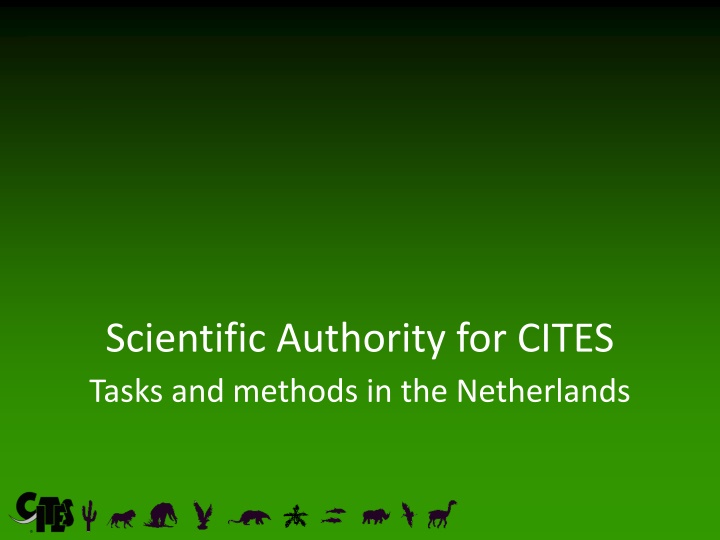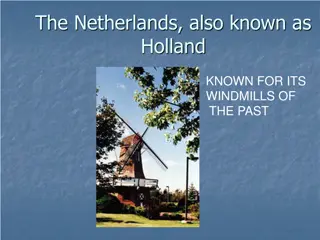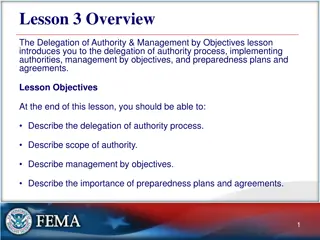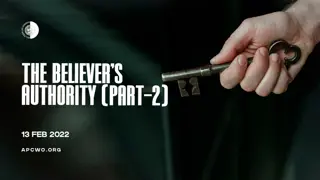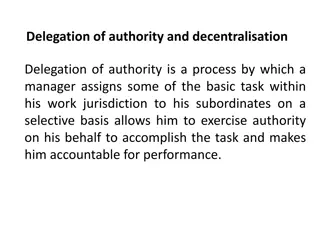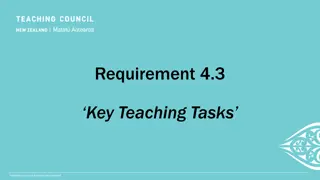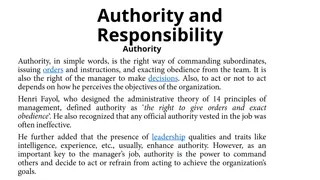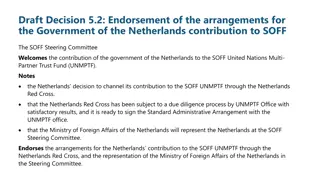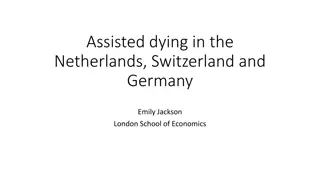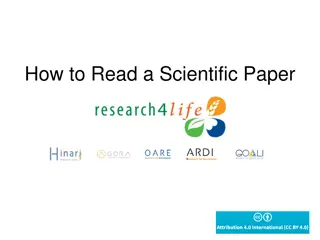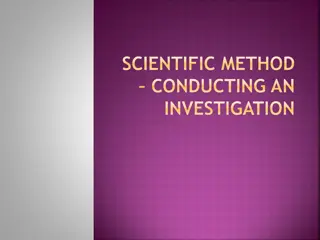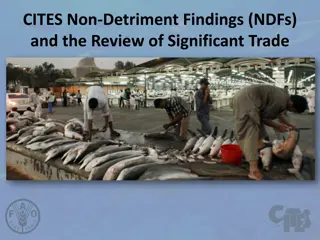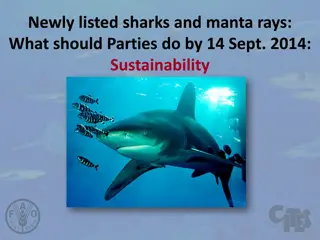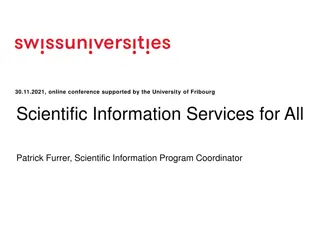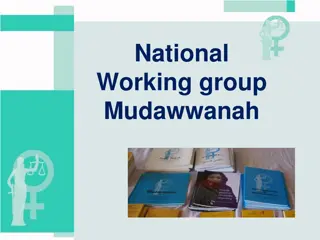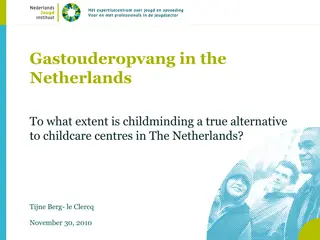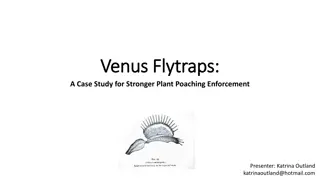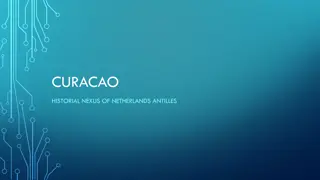CITES Tasks and Methods in the Netherlands - Scientific Authority Overview
The Netherlands has a Scientific Authority for CITES tasks and methods, playing a crucial role in the Convention on International Trade in Endangered Species of Wild Fauna and Flora. This independent body advises the Management Authority and assists in preventing extinction due to international trade by providing expert guidance and recommendations. The Scientific Authority relies on a group of specialists to assess requests and issue advice regarding import permits, non-detriment findings, origin verification, and adequate housing for traded species. With an annual average of over 400 advice requests, the authority's diligence and expertise ensure effective conservation efforts.
Download Presentation

Please find below an Image/Link to download the presentation.
The content on the website is provided AS IS for your information and personal use only. It may not be sold, licensed, or shared on other websites without obtaining consent from the author.If you encounter any issues during the download, it is possible that the publisher has removed the file from their server.
You are allowed to download the files provided on this website for personal or commercial use, subject to the condition that they are used lawfully. All files are the property of their respective owners.
The content on the website is provided AS IS for your information and personal use only. It may not be sold, licensed, or shared on other websites without obtaining consent from the author.
E N D
Presentation Transcript
Scientific Authority for CITES Tasks and methods in the Netherlands
CITES overview Convention on International Trade in Endangered Species of wild fauna and flora 181 countries (including entire EU) Avoiding extinction due to international trade Strict regulation via permit system Approximately 35.000 species Widely considered a successful convention
CITES, EU and Netherlands CITES-convention: Management Authority (permitting body) Scientific Authority (advising MA, independent of MA) CITES Secretariat (Switzerland) Translated into EU Directives 338/97 (Scientific Research Group or SRG) and 865/2006 Translated into Dutch Nature Conservation Act (Wet natuurbescherming)
Scientific Authority NL Independent authority At least 5 and at most 9 specialists, plus a secretary Appointed by Deputy Minister Economic Affairs Maximum 3 x 4 years Mostly unpaid work
Request for advice from MA Process Registration Literature study Sources: Previous advices European opinions Databases UN/WCMC IUCN Red Data List CITES trade database (Scientific) literature European SAs Exporting countries Other specialists Internet Draft advice Input from members Advice to MA
Statistics From request to advice usually < 4 weeks When consulting third parties > 4 weeks Annually 100-150 requests from MA Each request concerns 1-5 species Thus, roughly > 400 advices per year Mainly corals, plants (snow drops, orchids), reptiles and amphibians
Most common advices Article 4.2.a 338/97 Non-detriment finding or NDF Article 54/56 865/2006 Origin (A, F or C) Article 9.2.a 338/97 Adequate housing and caring (Annex A, origins W, F or U) Article 5.4 (5.2.a) 338/97 Export NDF
Article 4.2.a (NDF) Issuance of an import permit for Appendix I and II species requires that the Scientific Authority establishes that the import will not have a harmful effect on the conservation status or range size of the species ( non-detriment finding ).
Article 4.2.a (NDF) 1. Conservation status of the species (e.g., IUCN) 2. Vulnerability to trade 3. Trade level 4. NDF exporting country
Article 4.2.a (NDF) 1. Conservation status of the species: IUCN conservation status (CR, EN, VU, NT, LC, DD) Population trend Range size Habitat (e.g., early or late succesional habitat) Reproduction Threats
Article 4.2.a (NDF) 2. Vulnerability to trade: Balearica pavonina: Range size contracted 22-33% over the last 20 years. Beilfuss et al. 2007: Trade is considered as one of the main reasons for the decline. .
Article 4.2.a (NDF) 2. Vulnerability to trade: Encephalartos spp.: Small ranges
Article 4.2.a (NDF) 2. Vulnerability to trade: Phelsuma spp.: Several adaptive species. For example, P. dubia: can also be found near human dwellings .
Article 4.2.a (NDF) 2. Vulnerability to trade: Pandinus imperator: Slow reproduction (K-strategy) and easily collected in large quantities.
Article 4.2.a (NDF) 3. Trade level: Legal trade (CITES trade database; www.cites.org) Illegal trade Quota enforced
Article 4.2.a (NDF) 4. Non-detriment finding exporting country: Often unavailable ( EU NDF imports Appendix B) Availability and reliability range and trend data Management (e.g., legislation, quota) Enforcement
Article 4.2.a (NDF) Conclusion of Article 4.2.a 338/97 advice: Import does (not) have a harmful effect on the wild populations. Sometimes in combination with restrictions (body size, validity period, within quota).
Article 54/56 Issuance of an import permit for specimens with origin A, F or C requires that the origin is plausible. Global breeding results EU captive breeding database Actual trade in A, F or C Availability of W, price Supply versus demand
Article 54/56 Often specific information from breeder is required: Enclosures Husbandry (e.g., social groups, diet, incubation) Numbers and origin of founders Additions of W Annual production
Article 54/56 Dendrobates pumilio: Highly territorial Tadpoles require eggs from female Froglets require large amounts of small food items Easy to collect in the wild High demand for new morphs
Article 54/56 Dracaena guianensis: Natural nesting in termite mounts Little captive breeding Little supply, increasing demand
Article 54/56 Specific permit requirements to ensure origin A, F or C.
Article 54/56 Maximum size Difficult to capture small individuals in large quantities in the wild Sale at small size common to reduce costs of maintenance
Article 54/56 Closed bird rings
Article 54/56 Presence of cataphylls Tillandsia xerographica
Article 54/56 Enforcement Parasites or wounds (reptiles) Age (worn shells in old chelonians) Composition of poison in dart frogs Stable isotopes in chelonian shells
Article 5.4 (5.2.a) Exports from the Netherlands Re-exports reptiles and amphibians from many other EU countries Almost exclusively origins F and C
European coordination: SRG Positive advice MA can issue permit Negative advice MA cannot issue permit SA informs the European Commission European Commission informs all EU member states After 10 days, negative opinion SRG for all member states (immediate suspension) In case member states do not agree: refer to next SRG meeting
Validity of advices In general: 5 years for country/species combination. Unless: Change in opinion of SRG Change in quota or actual trade New information Annex A species (case-by-case advices)
